Lesson Learned - Homestead LIVESTOCK Mistake CORRECTED!

There have been some hard lessons learned on the homestead since we have moved here. The one that was most painful and stressful were the sheep we tried to originally raise here. I was convinced that I wanted to raise my animals naturally without medicines, wormers and being grass fed as much as possible.
Our mistake was picking the worst possible sheep breed for that challenge. We were doomed before we ever began. Literally, one of the two sheep we were gifted early on died before we even got to the land we live on now. When we finally moved on our current location, we bought more sheep of the same breed. One by one they kept dying. Our animal investment that was supposed to slowly multiply was instead quickly diminishing! This wasn't working out how I had imagined.
Commercial Breeds
Then someone very wise came and told me that this was cattle country and that the problem was worms in the ground. We had purchased what are called Commercial Breed Sheep. The breed was Shropshire and they are known for heavy meat and wool production. But they are grown on commercial farms where they only survive because they receive heavy doses of wormer and medicines and they basically live out of the GMO feed bucket. Over the centuries they were bred to the productions levels they are at now but during that time, all of their beneficial hardiness was also bred out of the animal. Sure they produced lots of meat and wool but their bodies could no longer fend off attacks of parasites or pull out of certain sicknesses. They were WEAK!
Heritage Breeds
So I started searching out Heritage Breed Sheep. I found a breed called the St. Croix which originates from the Virgin Island's island of St. Croix. They are a medium sized sheep and while they don't produce as much meat, they are hardy and resist parasitic infections.
After our disastrous bout with the Shropshires, a friend @shalomacres with a herd of St. Croix offered to give us two wether sheep (meaning males no longer in tact) to test for about 6 months. Because of the other sheep disaster, we thought maybe our pastures were too parasite infected to keep any breed alive. But the St. Croix did great and 6 months later we went back and purchased 2 breeding ewes and a ram. The only wormers I've given these sheep were some locally grown tobacco leaves. And not because they needed it, I just worked it into their diet every so often.
This week, the first of those females dropped two healthy females. Females are important as they will be needed to expand the herd in the years to come. So having two extra breeding females really is fantastic!
The weather this week hasn't been too cold so that will be good to get these girls going strong. But its really been wet with lots of rain. So we are trying to keep them separated and dry.
We are giving them fresh straw bedding every day and momma is happy with the alfalfa pellets she is getting. The lambs are happily wagging their tales when they are feeding from momma. When the weather dries out, we will take them out and get more pictures. The rest of the sheep pen is a messy swamp with all the rain we are getting.
One more thing I will add. We like natural products here on the homestead. You will often see it recommended to disinfect the naval of newborns and the remaining cord stump. People will suggest a variety of disinfectants for this task. We have chosen to use Nixall. It's a natural product that is a disinfectant that is actually found in the human body that destroys bacteria, viruses and pathogens. You can learn more at their website. We are looking forward to visiting with the Nixall team at the spring planting festival at Baker Creek in May. We hope to see you there!
So we have new sheep on the homestead! YAY!

Visit Us Online: http://AnAmericanHomestead.com
JOIN US ON SOLA (TWITTER REPLACEMENT) FOR MORE HOMESTEAD CONTENT

https://sola.ai/americanhomestead


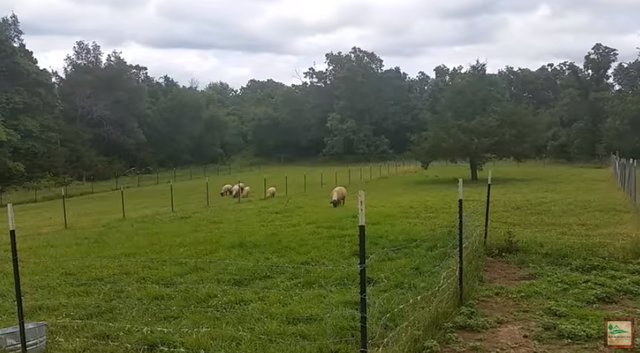
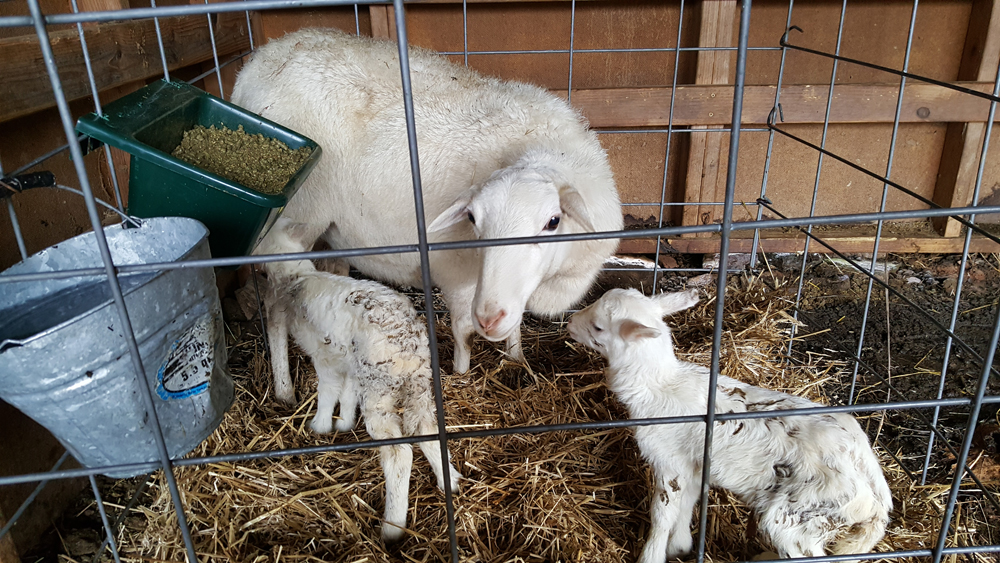
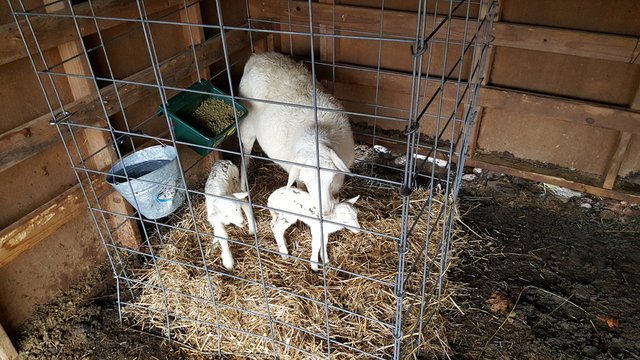
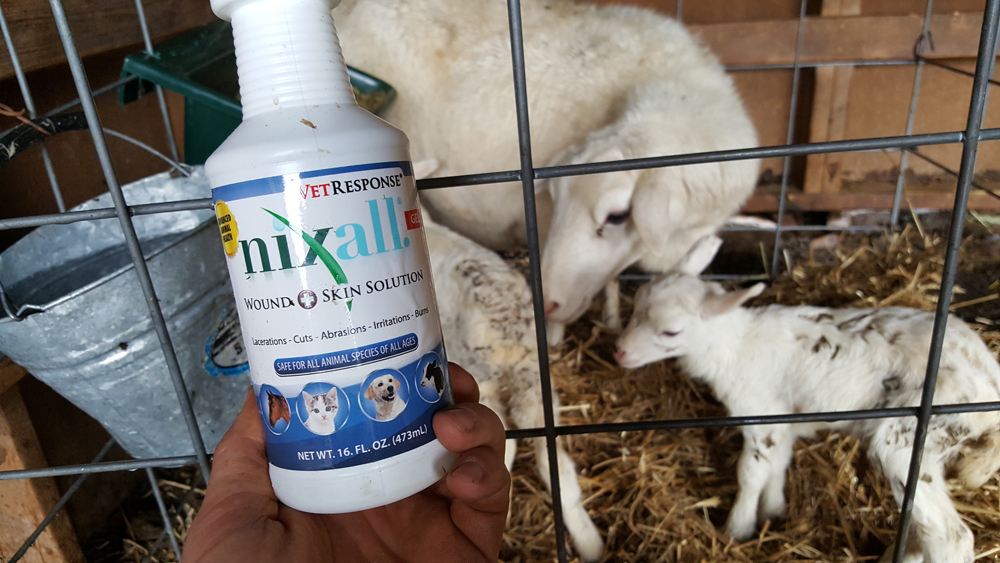
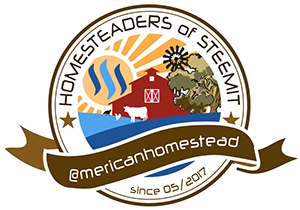


We went through the same thing with goats. We wanted to be big goat farmers so we bought a semi load of nannies from Montana (we live in Kentucky) with in 3 months over half of them died. They were not accustomed to the humidity and different parasites here. It has taken us 8 years but we now have a very low maintenance goat herd of about 100. Great post. Thanks for sharing.
@bowentroyer We are homesteaders in Kentucky too. What breed of goats are you raising? We started with Nigerian Dwarf goats and then started the switch to standard size dairy goats. in 2016 we lost half our herd in one week due to some random parasite, despite the goats being on a good dewormer regiment. We had to go to the vet's office and get two different dewormers (Cydectin and Valbasin - not sure if I spelled it right) to save the rest of the herd. We ended up selling the entire herd and were goat-free for six months. My husband hates goats for this reason. However, he did let me purchase one buck and two does because goats eat a lot of the stuff sheep don't eat in the pasture and he wants milk during the timeframe when our cow is dry. I'd be interested to hear what breed of goats you are raising. Also, if you ever have any for sale let me know as we may be interested or know someone who is. :)
@bowentroyer I should add that we have had great success raising sheep here in Kentucky, which is why that has been our main focus. We feel confident in raising goats now too, but that was one heck of a learning curve!
Goats have been a big learning curve. We have tried Boer Spanish and Kiko. Our herd now is all Kiko. It has taken us about 8 years but we now have a kiko goat that we can leave out with our cattle year round. We only worn them once a year when we get them all up to wean the kids. We currently have about 100 does. We sell our doeling in August/September. We have not tried sheep yet we have heard that they cannot eat the same mineral as our cattle due to copper in it. Thanks for finding me on hear. I love talking goats and sheep. Have a great day
Time and experience. The learning can be hard at first.
I completely understand your feelings. Having animals isn't easy at all very often not profitable too. You need allot of experience to know what's working and what not in your area. It's the same for rabbits you can suddenly have a rabbit disease and your whole population is death in a week...
Awesome to see new babies on the homestead!
Yes we are very excited.
Very nice never raised the St. Croix breed before but looks like a good fit for your farm. Them being a hair breed will also make them much easer to take care of no shearing.
The pelts are still nice and you can get about $100 on ebay for a tanned pelt. But yeah, I would rather have the hair sheep.
I know the feeling about sheep. Everyone that I tried to raise..died.
Ugh all of them? Are goats tougher? I was thinking of taking sheep or goats because I live in a area with very very infertile acidic heathland.
Just research heritage breeds. Goats are a whole other story. If you like the challenge of raising unruly teenagers, then get goats. Sheep at least won't try and destroy everything you build.
From another friend who raises goats for meat and milk, "It's not if they will get out of the fenced pasture but when."
@gogreenbuddy - we have found that the learning curve for us was much easier with sheep than it was for goats. That is just our experience, of course. We lost quite a bit of our goat herd in 2016 over the course of a week. I think we had around 15 goats and 7 died in a week (the week we returned from a 10 day trip). We had about 8 sheep at the time in the same pasture and only lost one, which was a really young lamb (so maybe more susceptible to disease?). Anyway, goats are escape artists and have lots of personality. Honestly, it is their personalities that attract me to goats. They are so much fun! My husband is more of a sheep guy because they are more "stable" in the personality department. :)
I had goats too...(Nubians and Angoras) not a problem. High Plains of Texas.
Goats and sheep are about the same for getting parasites depending on the breed. Would look at what is in you your area that is doing well on other farms like yours. Goats like browse and sheep prefer grass. Sheep are a little easer to keep in side the fence than goats. Just something to think about good luck.
It's all about the breed.
isn't it always?
(you hear an engine rev and horn honk)
MEEP! MEEP!
(the window on the humvee rolls down to reveal a warm smiling face)
"Hello! I'm @shadow3scalpel and with the help of my protege, @chairborne, we are actively assisting veterans, retirees and active servicemen and women here on Steemit. We feel it is our 'duty' to support each other. Any questions or comments you may have, simply respond to this comment, thank you!"
(the window rolls up and the engine roars as it drives to the next person on the list)
Comment by @killerwhale. This is a opt-in bot.
So excited for you all! And what a blessing to get twin ewe lambs!
The sheep look very happy! I bet the little ones will be even more excited when they have more room to jump and play!
I've seen the same things with chickens from factory farms which couldn't survive without the chemicle dosed feed.🐓So when certain traditional breeds of rural chickens were brought in (even though they had slightly less yield) they all thrived and were healthy.🐔
Thanks for sharing!
@egodust - We have an Amish "neighbor" who raises "free range" organic chickens for egg production. Every 13 months he has to cycle out his birds and get a new flock. The birds are about 18 months old when he switches them out, so he sells them for $2/bird. They still have a good six months or so of laying and then you could butcher, although they aren't very "meaty" you could still make a good broth with them with a little meat. We bought 75 birds from him with the intention of letting them lay for another 5-6 months and sell the eggs. Then retire them into the freezer. We put them out to free range and they had no idea what to do. We had to feed them a ridiculous amount of feed to keep them laying. We went ahead and sold them as we just felt it wasn't worth the expense of the feed. And these chickens were raised "organically" with outside access so were considered "free range" on the carton. Sigh. :/
So awesome that your posts are powered by solar!
Good Stuff.🥇
Looking good sir!
THANK YOU!